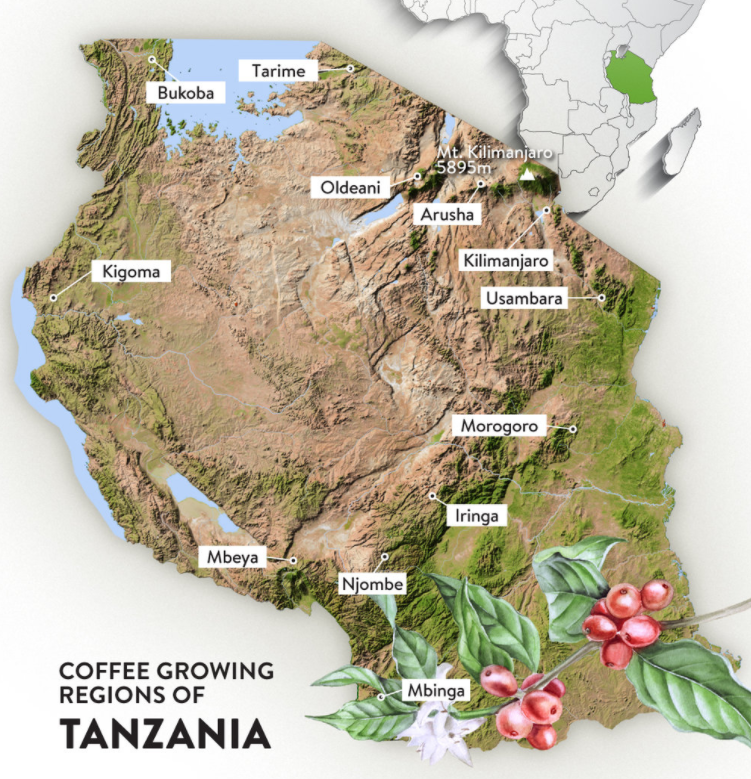
TANZANIA
TANZANIA: Coffee from the rooftop of Africa
Located next to Ethiopia and Kenya, Tanzania is famous for its coffee culture.
Located in the East of Africa, Tanzania shares a border with Kenya and sits next to Ethiopia which is known as the cradle of coffee with a brilliant history.
For the most part, Arabica coffees (especially peaberries) are from Mount Kilimanjaro and Mount Meru of Tanzania. Before being exported, it is called "Kilimanjaro coffee". The coffee beans are all meticulously selected and went through a careful wet process.

Coffee production in Tanzania
Tanzania is among the top 15 coffee exporting countries with an annual export volume of 790,000 bags (60 kg/bag). According to the statistics of Cafelmports, Tanzania had about 450,000 small householders in 2017. Tanzania's economy is mostly agricultural and provides 24% of its gross domestic product.
Coffee farming activities on medium-sized farms of 0.5-2 ha are mainly in the Arusha, Kigoma, Kilimanjaro, Mbeya, Ruvuma, and Tarime areas. Coffees from Tanzania all go through wet processing and sorting. They are exported mostly to Japan (22%), Italy (19%), and the United States (12%).

Outstanding coffee-growing areas
Tanzania coffee is from Arusha, Bourbon, Blue Mountain, Kents, etc. However, Kilimanjaro is the most famous place with three favorite coffees, namely Moshi, Arusha, and Kilimanjaro.

These coffees are grown in the hills of Kilimanjaro, next to Kenya, which are about 1,200m above sea level. It meets the high-quality cumulative retardation standard height for SHG (Strictly high grown) coffees.
According to British criteria, Tanzania coffee is based on the shape and size of the beans which is similar to Kenya coffee. The highest grade is symbolized as AA, following by PB (Peaberries), AB, C, E., F, AF, TT, UG, and TEX.
Peaberries coffee
Peaberries (or Peaberry) coffee is one of the most prized, rare, and expensive coffee beans in Tanzania.
Unlike conventional coffee berries with two beans in each fruit, Peaberry coffee only contains a single bean called Culi in Vietnam.
Perhaps because there is only one seed in each fruit, all the essence seems to be devoted entirely to that round seed, making the seeds accumulate full of strong flavors and outstanding aroma in comparison with other coffee.
Therefore, people always roast Peaberries solely, ensuring uniformity and its values. That explains why Peaberries become rare, expensive, and always valued as high-quality coffee.
Tanzania Coffee Research Institute
Founded in 2000, The Tanzania Coffee Research Institute is a government-affiliated non-profit organization and started operating in the early days of 2001.
Before the decrease in Tanzania coffee production in the 1990s, the Institute held the task of rejuvenating the domestic coffee industry and increasing coffee export revenues, supporting more than 1,000 farmers in the technology and knowledge to improve the efficiency of agricultural production.
To Tanzanians, the coffee tree is meaningful. It is not only a source of livelihood but also a familiar companion. From the original high-quality coffee beans, they carry on a journey as a national heritage.

- Reference :
http://www.coffeebehindthescenes.com/
